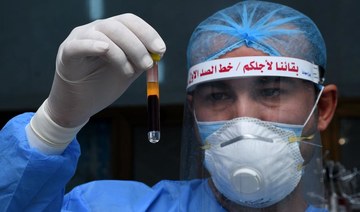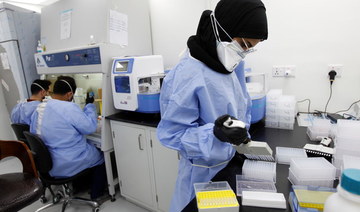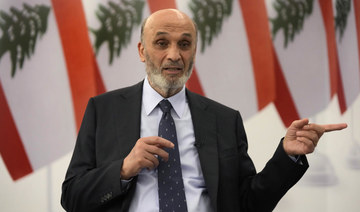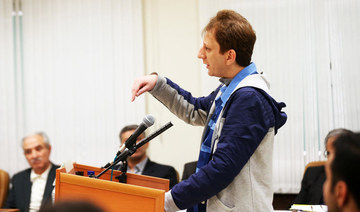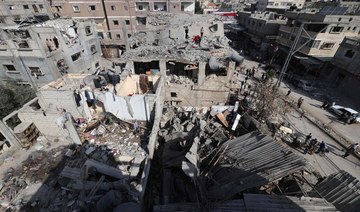BAGHDAD: In the busy emergency room of Baghdad’s main public hospital, Ali Abbas stood face uncovered, waiting for his sickly father. Dozens of other patients and their relatives mingled without masks.
It’s a scene that confounds health workers in Iraq, who warn that the country is entering a new wave of coronavirus cases, in part because many shirk precautions.
“I don’t believe in the coronavirus, I believe in God,” the 21-year-old Abbas said in the middle of the hospital floor, defying the facility’s rules requiring masks.
On Friday, Iraq was under its first full day of a new curfew imposed by the government in response to infection rates that have shot back up again after easing last autumn. The curfew runs all day Friday to Sunday, and from 8 p.m. to 5 a.m. the rest of the week. Mosques and schools are closed, large gatherings prohibited, and the wearing of masks and other protective gear will be enforced, according to a statement from the government.
A complete lockdown, including closing airports and borders, is also being considered, two government officials said, speaking on condition of anonymity because they were not authorized to brief the media.
New cases, down under 600 a day just a month ago, have sharply increased, reaching 3,896 a day on Feb. 18 and approaching September’s daily peak of more than 5,000. The Health Ministry says 50 percent of the new cases are from the new, more infectious strain that first broke out in the UK More than 657,000 people have been infected by the virus in Iraq and 13,220 have died since February.
Doctors told The Associated Press they’ve seen the flare-up coming for weeks. They blame a careless public and a government unable to fully enforce virus protocols.
“I am a doctor fighting public ignorance, not the pandemic,” said Mohammed Shahada, a pulmonologist at Baghdad’s Al-Zahra Hospital.
At Al-Zahra Hospital, the year began with just four patients in the 90-bed isolation ward. By the start of February, that jumped to 30 severe virus patients. Shahada expects more in the coming weeks.
At his private clinic, some patients have walked out rather than abide by his strict face mask requirement, he said.
Ismail Taher, a doctor at Baghdad’s Sheikh Zayed hospital, estimated that only one in 10 people walking into his hospital wear masks.
The Health Ministry said earlier this month that a new wave was being driven by religious activities — including Friday prayers and visits to shrines — and large crowds in markets, restaurants, malls and parks, where greetings with handshakes and kisses are the norm.
The ministry also blamed “some people who are openly questioning the existence of the pandemic.”
That’s a common sentiment.
“It’s just the flu,” said Yahya Shammari, a 28-year-old college graduate. “I went to the hospital twice with no mask on and I didn’t get infected.”
Rahem Shabib, 32, said he noticed how infection rates dipped following the Shiite Muslim Arbaeen pilgrimage in October. “So, God is stronger than COVID-19,” he said.
Mac Skelton, a medical sociologist at the American University of Iraq in Sulaimaniyah, said the dismissive attitude was not so much rooted in ignorance as in the realities Iraqis face.
Iraqis have endured so many calamities the past few decades, including wars, political violence and sanctions, that COVID-19 “may not stack up as a major problem,” he said.
Also, government pandemic policies, centered on hospitals, don’t mesh with how Iraqis cope with illness, said Skelton. Amid years of instability, Iraqis had to come up with their own strategies, because health care was either not available or they distrusted hospitals, which at the height of sectarian fighting became dangerous places to go to.
So, they seek out pharmacists, nurses, help from neighbors, or even cross borders to treat illness.
“Most doctors are not that surprised, they know patients would refuse to go to hospital unless they were gasping for air and had no choice,” said Skelton, director of the university’s Institute of Regional and International Studies.
Old habits imperil Iraq as doctors warn of second coronavirus wave
https://arab.news/6mhuc
Old habits imperil Iraq as doctors warn of second coronavirus wave
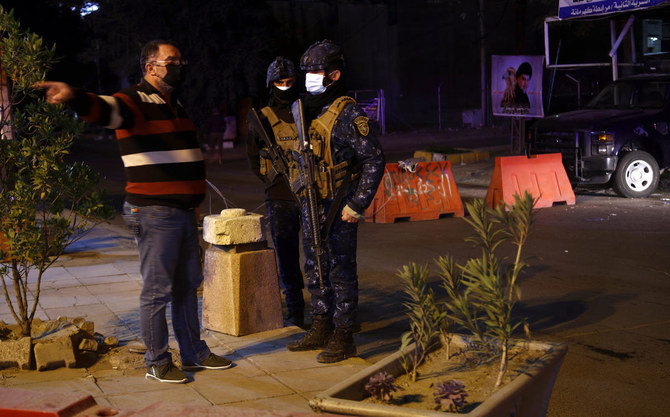
- ‘I don’t believe in the coronavirus, I believe in God’
- Health ministry blames ‘some people who are openly questioning the existence of the pandemic’
UAE FM discusses Gaza with Israel’s opposition leader
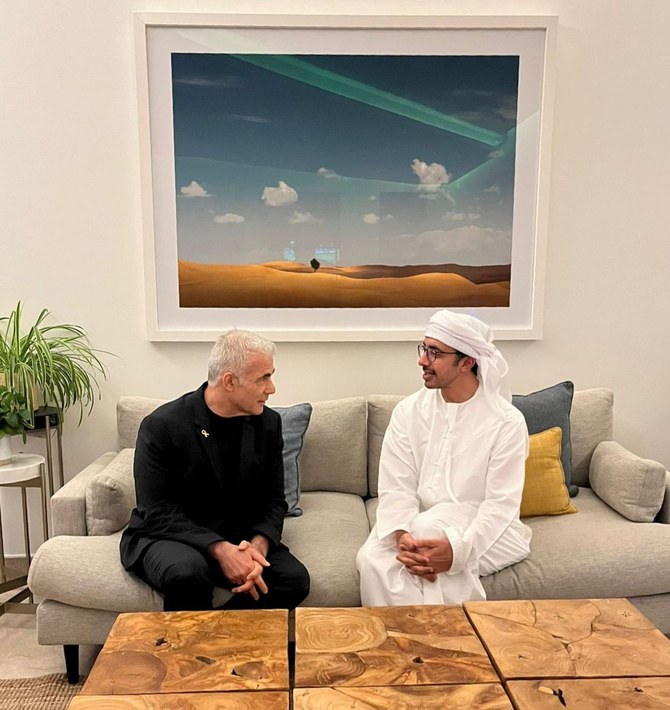
- Sheikh Abdullah stressed the need to restart talks on the two-state solution in Palestine
ABU DHABI: The UAE’s Foreign Minister Sheikh Abdullah bin Zayed Al-Nahyan held discussions on developments in Gaza with Israel’s opposition leader Yair Lapid in Abu Dhabi recently, Emirates News Agency reported on Thursday.
During the meeting, Sheikh Abdullah stressed the need to restart talks on the two-state solution in Palestine, which he said would ensure permanent regional peace and security.
He called for additional efforts to reach an immediate ceasefire in Gaza, which would prevent the conflict spreading to the rest of the region.
Sheikh Abdullah added that it was important for aid to reach Gaza, and that the lives of civilians should be protected.
Palestinian security force kills Islamic Jihad gunman in rare internal clash
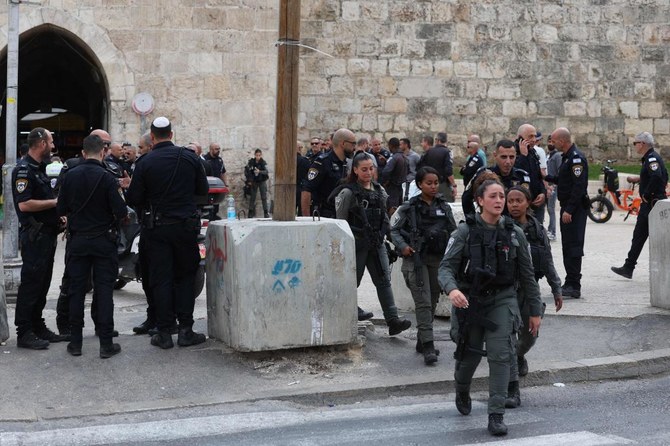
- Al-Foul was “treacherously ... targeted in his car” without provocation, the brigades said in a statement. “This crime is just like any assassination by Israeli special forces.”
RAMALLAH: Palestinian security officers killed a gunman in the occupied West Bank on Thursday, a rare intra-Palestinian clash whose circumstances were disputed and which the fighter’s faction described as an Israeli-style “assassination”.
Palestinian Authority security services spokesperson Talak Dweikat said a force sent to patrol Tulkarm overnight came under fire and shot back, hitting the gunman. He died from his wounds in hospital.
Videos circulated online, and which Reuters was not immediately able to confirm, showed a car being hit by gunfire.
A local armed group, the Tulkarm and Nour Shams Camp Brigades, claimed the dead man, Ahmed Abu Al-Foul, as its member with affiliation to the largely militant group Islamic Jihad.
Al-Foul was “treacherously ... targeted in his car” without provocation, the brigades said in a statement. “This crime is just like any assassination by Israeli special forces.”
President Mahmoud Abbas’ PA wields limited self-rule in the West Bank, and sometimes coordinates security with Israel.
Parts of the territory have drifted into chaos and poverty, with the PA and Israel trading blame, especially since ties have been further strained by Israel’s offensive in Gaza.
Hamas, an Islamic Jihad ally which rules the Gaza Strip and has chafed at Abbas’ strategy of seeking diplomatic accommodation with Israel, denounced “the attacks by the PA’s security forces on our people and our resistance fighters”.
Palestinian security forces and gunmen have exchanged gunfire several times in the last year, but deaths are rare.
EU offers 1 bln euros in economic, security support to Lebanon
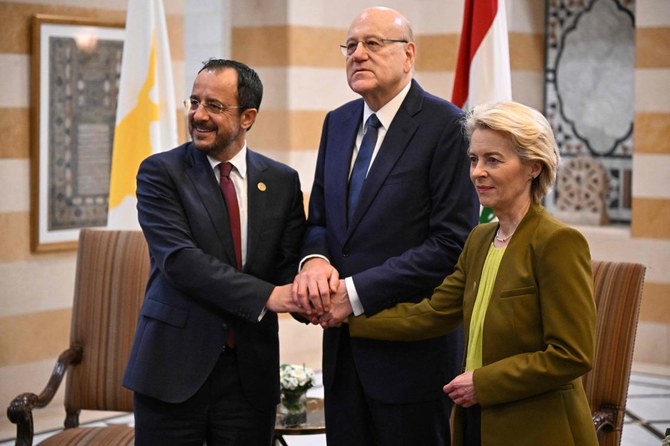
- The funds would be available from this year until 2027
BEIRUT: The European Union has offered Lebanon a financial package of 1 billion euros ($1.07 billion) to support its faltering economy and its security forces, European Commission President Ursula von der Leyen said on Thursday during a visit to Beirut.
Von der Leyen said the support package would help bolster basic services in Lebanon, including health and education, though she added that it was crucial for Beirut to “take forward economic, financial and banking reforms” to revitalize the business environment and banking sector.
Speaking alongside Lebanon’s Prime Minister Najib Mikati and Cypriot President Nikos Christodoulides, she said security support to the Lebanese army, the internal security forces and General Security would be focused on providing training, equipment and infrastructure to improve border management.
Lebanon’s economy began to unravel in 2019 after decades of profligate spending and corruption. However, vested interests in the ruling elite have stalled financial reforms that would grant Lebanon access to a $3 billion aid package from the International Monetary Fund.
As the crisis has been allowed to fester, most Lebanese have been locked out of their bank savings, the local currency has collapsed and public institutions — from schools to the army — have struggled to keep functioning.
In parallel, Lebanon has seen a rise in migrant boats taking off from its shores and heading to Europe – with nearby Cyprus and increasingly Italy, too, as the main destinations, researchers say.
Iran slaps sanctions on US, UK over Israel support
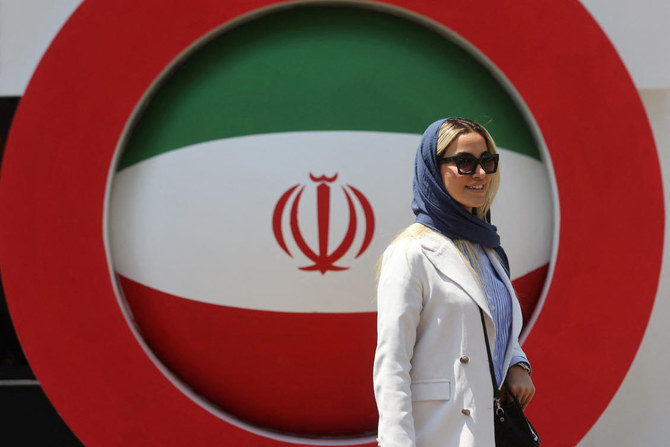
- Sanctions targeted seven Americans
- British officials and entities targeted include Secretary of State for Defense Grant Shapps
TEHRAN: Iran announced on Thursday sanctions on several American and British individuals and entities for supporting Israel in its war against the Palestinian militant group Hamas.
The Islamic republic, the regional arch-foe of Israel, unveiled the punitive measures in a statement from its foreign ministry.
It said the sanctions targeted seven Americans, including General Bryan P. Fenton, commander of the US special operations command, and Vice Admiral Brad Cooper, a former commander of the US Navy’s Fifth Fleet.
British officials and entities targeted include Secretary of State for Defense Grant Shapps, commander of the British army strategic command James Hockenhull and the UK Royal Navy in the Red Sea.
Penalties were also announced against US firms Lockheed Martin and Chevron and British counterparts Elbit Systems, Parker Meggitt and Rafael UK.
The ministry said the sanctions include “blocking of accounts and transactions in the Iranian financial and banking systems, blocking of assets within the jurisdiction of the Islamic Republic of Iran as well as prohibition of visa issuance and entry to the Iranian territory.”
The impact of these measures on the individuals or entities, as well as their assets or dealings with Iran, remains unclear.
The war in the Gaza Strip erupted after the October 7 attack by Palestinian militants on Israel which killed 1,170 people, mostly civilians, according an AFP tally based on official Israeli figures.
Iran backs Hamas but has denied any direct involvement in the attack.
Israel’s retaliatory offensive against Hamas has since killed at least 34,568 people in Gaza, mostly women and children, according to the Hamas-run territory’s health ministry.
12-truck UAE aid convoy enters Gaza Strip

- UAE has also sent Palestinians food, water via sea, air
- Emirates has provided medical treatment for thousands
Al-ARISH: A UAE aid convoy entered the Gaza Strip on Wednesday via Egypt’s Rafah Crossing Point as a part of the country’s “Operation Chivalrous Knight 3” project to support the Palestinian people, UAE state news agency WAM reported on Thursday.
The 12-truck convoy is transporting over 264 tonnes of humanitarian aid including food, water and dates.
The latest convoy now brings to 440 the number of trucks that have been used for support efforts.
As of May 1, 2024, the UAE has now provided the Palestinians 22,436 tonnes of aid, which has included the deployment of 220 cargo planes and three cargo ships. The goods pass through Al-Arish Port and the Rafah crossing into Gaza.
These efforts are a part of the “Birds of Goodness” operation, which involves aerial drops of humanitarian supplies. By Wednesday, 43 drops have been conducted, delivering a total of 3,000 tonnes of food and relief materials to inaccessible and isolated areas in Gaza.
Since its establishment, medical staffers at the UAE’s field hospital in Gaza have treated more than 18,970 patients. An additional 152 patients were evacuated to the UAE’s Floating Hospital in Al-Arish Port, and 166 to the UAE for treatment.
The UAE has set up six desalination plants with a production capacity of 1.2 million gallons per day to support the people in Gaza.



